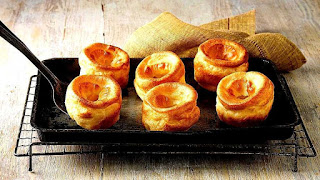
Yorkshire pudding is an English food made from batter consisting of eggs, flour, and milk or water. It is a versatile food that can be served in numerous ways depending on the choice of ingredients, the size of the pudding(s) and the accompanying components of the dish. As a first course it can be served with onion gravy. For a main course it is often served with beef and gravy and is part of the traditional Sunday roast, but can also be filled with foods such as bangers and mash to make a meal. Jam and sugar can be added instead if served as a dessert.
Video Yorkshire pudding
History
When wheat flour began to come into common use for making cakes and puddings, cooks in the north of England devised a means of making use of the fat that dropped into the dripping pan to cook a batter pudding while the meat roasted. In 1737, a recipe for "a dripping pudding" (later named "The Yorkshire Pudding") was published in the book The Whole Duty of a Woman:
Make a good batter as for pancakes; put in a hot toss-pan over the fire with a bit of butter to fry the bottom a little then put the pan and butter under a shoulder of mutton, instead of a dripping pan, keeping frequently shaking it by the handle and it will be light and savoury, and fit to take up when your mutton is enough; then turn it in a dish and serve it hot.
Similar instructions were published during 1747 in the book The Art of Cookery made Plain and Easy by Hannah Glasse, with the name 'Yorkshire pudding'. It was she who renamed the original version, known as Dripping Pudding, which had been cooked in England for centuries, although these puddings were much flatter than the puffy versions made today. William Sitwell suggests that the pudding got the name 'Yorkshire' due to the regions association with coal and the higher temperatures this produced which helped to make the batter crispier.
Originally the Yorkshire pudding was served as a first course with thick gravy to dull the appetite with the low-cost ingredients so that the diners would not eat so much of the more expensive meat in the next course. An early recipe appeared in Sir Alexander William George Cassey's The Whole Duty of a Woman during 1737. Because the rich gravy from the roast meat drippings was used up with the first course, the main meat and vegetable course was often served with a parsley or white sauce.
In poorer households, the pudding was often served as the only course. Using dripping, a simple meal was made with flour, eggs and milk. This was traditionally eaten with a gravy or sauce, to moisten the pudding.
The Yorkshire pudding is meant to rise. The Royal Society of Chemistry suggested during 2008 that "A Yorkshire pudding isn't a Yorkshire pudding if it is less than four inches tall".
Maps Yorkshire pudding
Cooking method
Yorkshire pudding is cooked by pouring a batter made from milk (or water), flour and eggs into preheated, oiled, baking pans, ramekins or muffin tins (in the case of miniature puddings). A basic formula uses 1/3 cup flour and 1/3 cup liquid per egg. Water produces a lighter crisper but less sweet pudding than using milk.

Similar foods
Other foods made from batter include popover, a hollow roll; Gougère, a savoury pastry; Dutch baby pancake, a breakfast dish; Toad in the hole; David Eyre's pancake, another breakfast dish; takoyaki, Japanese puff batter dumpling with octopus; and clafoutis, French-style cherries in batter.

Yorkshire Pudding Day
Yorkshire Pudding Day is celebrated on the first Sunday in February in Britain and on October 13th in the United States.

References

External links
- Yorkshire Pudding at Wikibook Cookbooks
- Media related to Yorkshire pudding at Wikimedia Commons
Source of the article : Wikipedia


